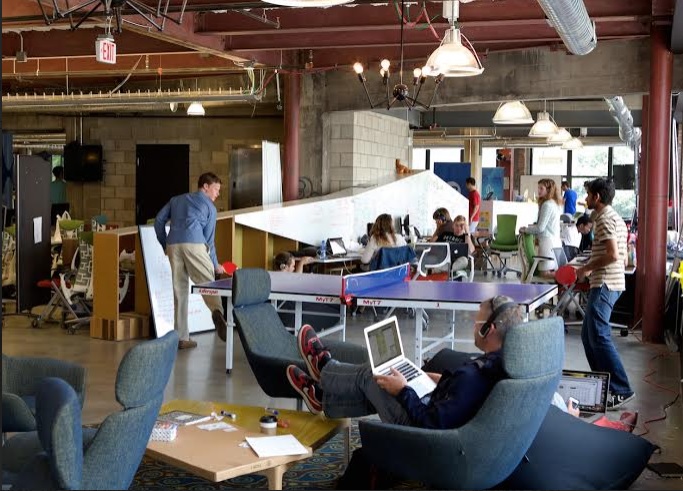A burgeoning tech startup scene is stirring the ashes of the once-great city of Detroit. It’s constructing new office space, giving young entrepreneurs a place to launch and giving off a powerful feeling that something is about to blow the roof off this city.
The momentum started a few years ago, fueled by some wealthy homegrown investors. Detroit Venture Partners is one firm run by some Detroit heavy-hitters such as Quicken Loans chairman Dan Gilbert, also owner of the Cleveland Cavs. The venture capital firm invests in early-stage digital technology companies.
“There’s an ancient Chinese proverb that says, those that say it can’t be done should get out of the way of those doing it,” Gabe Karp, another partner at DVP told me. “We picked Detroit because we’re passionate about it, but there is an exciting resurgence here, and we all want to be a part of it.”
According to DVP, on the list of outside investors with an eye on Detroit are Draper Triangle, Google For Entrepreneurs, Steve Case and Chicago-based Light Bank. Ted Serbinski, another DVP partner recently announced he will be leading the newly formed TechStars Mobility set to launch in Detroit in the coming months; they’re currently accepting applications.
With the movers and shakers firmly in place supplying the framework for investment and growth, the innovators are slowly blossoming.
“Detroit a year and a half ago was for early adopters. I think the bankruptcy was good for that. It was unstable and unclear, but once the bankruptcy was filed, it actually brought stability to us.” Karp said. “But we’re now past the early adopter phase and onto the next. I know the reputation. People used to say to me, ‘you’re from Detroit, I’m sorry to hear that.’ But we’re also not doing this to prove anything, we’re doing it because we’re good at it.”
And being good at it is exactly why the scene is well positioned for a renaissance with additional help from accelerators like Bizdom Detroit and Cleveland. Bizdom, founded by DVP’s Dan Gilbert, was created to provide the support and resources necessary for entrepreneurs to get their businesses off the ground in both cities.
Ross Sanders, Executive Director of Bizdom knows first hand what expertise and funding can do for struggling cities. “We’re here to play a role in converting these cities from muscle economies to brain economies. There was not a good entrepreneurial ecosystem in either city before, so founders weren’t launching businesses here because of that. We launched in Jan. 2012, and while we haven’t had a major acquisition yet, we’re creating jobs, wealth, and commerce.”
Some Bizdom early success stories include GreenLancer, a SaaS platform for solar panel installers. The early stage company recently won first place in Solar Power International’s “Start Up Alley” Competition. And Bizdom’s Cribspot, which brings together thousands of student apartments and houses on one simple, searchable map, took best in show at TechWeek Detroit last fall.
Startup founders from Detroit are welcoming the opportunity to stay in the region to grow their companies.
Joe Minock, founder of PaymentScholar, a Bizdom startup, says it’s great to be building something in his home state. “I could have easily taken my concept, experience, and network with me to New York or San Francisco, but for me, a greater measure of success is to build a company here in Detroit and not be just another number. There are enough startups heading to the coasts. I like the challenge of growing a business and building something that can impact the region.”
More established service-based companies have benefited from the region’s growing rebirth, like mobile development studio Detroit Labs. But insiders warn that the growth is not without challenges. Erica Carlson, a software engineer at Detroit Labs and an organizer of one of the top Girl Develop It chapters in the country, explained:
“One of the problems with the new Detroit resurgence is that more and more companies are coming in and there are not enough people qualified for the jobs, but it’s also a problem everywhere. We’re saying come live in Detroit versus Silicon Valley or New York, which in itself is a challenge. So we hire developers from other disciplines, and we have an apprenticeship program for candidates with no prior experience that also helps diversify our development team.”
The Detroit Labs Apprentice Program is a three-month immersion course in mobile development. Applicants are not required to have any software experience. They receive classroom training in programming fundamentals, engage in directed study with video courses and tutorials, develop and build mobile apps as a team, receive coaching and mentoring from Detroit Labs engineers, and gain experience in all aspects of life as a mobile developer. The apprenticeship is a full-time, paid position, and apprentices are eligible for promotion to Detroit Labs upon successful completion of the program.
As a Detroit native with first-hand knowledge of the scene, Carlson explains what makes her town different from other startup communities: “Detroit has gone through so many cycles. This scene is very young but very collaborative. When you’re in a city with problems, it challenges you to solve problems. It’s one of the things that keeps me here, being able to have an impact on this change that’s happening.”
Karp echoed that sentiment. “All communities are great in their own way, but Detroit has a grit that I haven’t seen other places. I’ve started offices in Seattle, L.A., and New York. But Detroit has been through tough times and we’re still here. Grittiness combined with Midwest values makes us different. There are great benefits to being in a place like Silicon Valley, but there are challenges there too. You don’t get the loyalty from your teams there. Developers are like mercenaries there; they wait for options to vest then they move on. We’ve created jobs for the people here, and we’re attracting talent now too.”
One of the reasons Karp is investing in Detroit is to help shape the city’s future. “I can go work anywhere, but I really like to have a direct impact on authoring the new chapter that’s being written here. So I can look back and say I was one of the early movers.”
“About 30% of [Bizdom’s applicants] are from outside Michigan and Ohio,” Sanders said. “What they like about Bizdom is being part of a bigger story. If you succeed in a city like Detroit or Cleveland, you’re part of a bigger story. Two years ago there was not much here, now we have four full buildings, two angel investment funds, and now TechStars is coming. We’re seeing this critical mass in the area, and that’s when TechStars gets involved.”
And those growing businesses and full buildings also mean that real estate investment has scaled with the escalating scene. “It’s interesting to see how real estate investment has followed that path,” Karp said. “As more and more action happens in the real estate market, the institutional, highly risk averse investors are now putting money in Detroit.”
 Google has had an office in Detroit and Ann Arbor for years — cofounder Larry Page attended the University of Michigan and is from East Lansing. But Twitter has recently opened an office in the M@dison Building in downtown Detroit, considered ground zero for the local startup scene, and other companies are following suit.
Google has had an office in Detroit and Ann Arbor for years — cofounder Larry Page attended the University of Michigan and is from East Lansing. But Twitter has recently opened an office in the M@dison Building in downtown Detroit, considered ground zero for the local startup scene, and other companies are following suit.
Mobile platform Shazam recently hired Bob Lanham as Regional Vice President, also an early employee at Hulu, who said to be successful in Detroit, you have to speak the language:
“The Detroit marketplace is very different from New York, just like New York is different from Chicago. It’s difficult to have people from outside Detroit, call on Detroit, because it’s a very unique marketplace. You have people that don’t go out of state for college, and if they do, they come back. The media world here is a tight knit community, and if you want your platform to succeed here, you have to have someone here. Agencies don’t have the staff that they used to have, and everyone wants [Chevrolet’s] money for example. These agency people are swamped so you can’t just be another email coming in from New York trying to get with the Director of Digital and expect to get a piece of Chevy’s almost one billion dollar media budget. So having someone in the marketplace, with not only an understanding of your product, but how to sell it in Detroit, is essential.”
Lanham also said Detroit is having a profound impact on the entire region. “Detroit is more than just the city of Detroit, it does expand into parts of Ohio simply because that’s the region that reps cover. And what’s fun about Detroit is that advertisers are willing to experiment with emerging technology. So if you look at SnapChat, that company used to be 10 people in a room managing servers, now they’re getting into advertising. And I know one of the big three (automakers) is going to get involved and test it out. Look at Twitter, when they opened in Detroit it was one guy, now they have 4 or 5 people here. So what’s great about Detroit is that if you have a product with scale, and it’s not overly disruptive, Detroit will give it a shot.”
The growth of the Detroit startup scene has also had some direct influence on the region’s entrepreneurial ecosystem as a whole. Jessica Sattler, Director of Economic Engagement & Business Development Programs at The University of Toledo (about an hour out of Detroit), said the area is becoming known for collaboration.
“What’s interesting about our region is that most entities with a vested interest in entrepreneurship are open to working together,” she said. “In other areas of the country the Chamber of Commerce, the Regional Growth Partnership etc. are all so busy trying to be the top resource, but here we’re more willing to work together to provide resources that matter. We know we’re losing talent to the coasts, but we’re making progress. Right now we’re in an entrepreneurial and innovation revolution, and we have the resources to support that type of growth in this region.”
Molly Reams Thompson heads the University of Toledo’s incubator space and said the region could use more investment dollars to grow the innovators that are here. “We’re a like-minded community focused on grassroots growth,” she said. “We don’t have the investment resources that Boston, Boulder, and other areas might have. But we are a historically self starting community that has a great talent pool. And that’s getting more notice from corporate investment.”
As Karp put it, “We’re viewed as a fly-over state. But what we’re seeing now is a lot of people stopping here.”
We hope they’re stopping long enough to take a second look at a region slowly shaking off the dust of decades of decline and on the verge of reinventing itself through innovation and technology.
Brandy Alexander-Wimberly is an independent writer, digital strategist, startup founder and member of the Interrupt team, a strategic channel marketing agency that specializes in building product and home automation companies. She is also founder of the blog Silicon Rust Belt, follow her at @SiliconRustBelt.
VentureBeat's mission is to be a digital town square for technical decision-makers to gain knowledge about transformative enterprise technology and transact. Learn More


